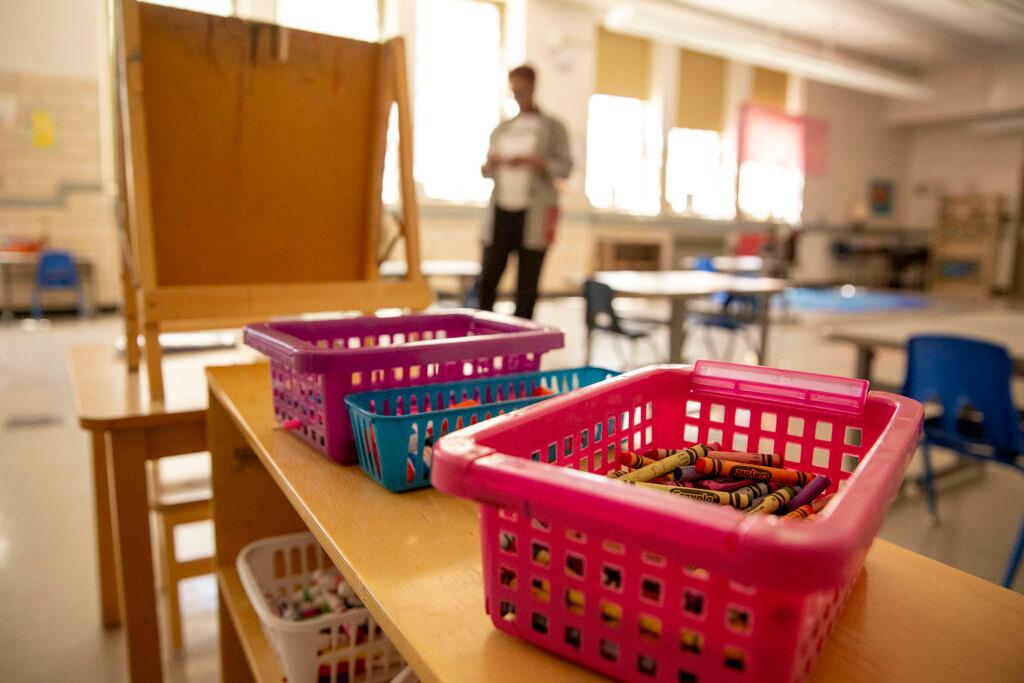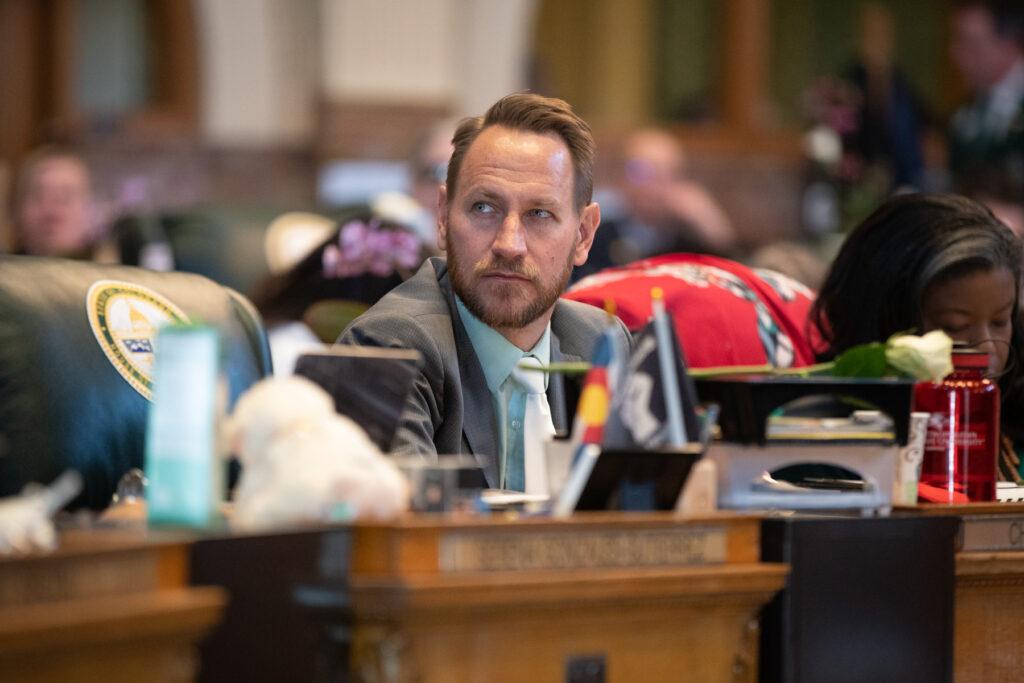
In a recent year, when she was earning $45,000 as a teacher, 24-year-old Brenna Minkler spent $1,300 of her own money on pencils, papers, and notebooks for her third-grade classroom in Adams County.
Actually, it was more than that.
“I was budgeting, and I was up to $1,300 when I decided to stop calculating any further,” she said, sharing a story that is all too common among teachers.
A few state lawmakers say they have a solution. A bipartisan proposal, HB24-1221, would pay teachers up to $1,000 each — in the form of a refundable tax credit — to cover spending on classroom supplies.
“This is a problem that we know about, that surfaces over and over again — the fact that our teachers are goodhearted, kind individuals,” said Rep. Matt Soper, a Republican sponsor of the measure. “They're not going to let their students fall behind. But it's also not fair.”
But similar Republican-backed measures have failed five times in previous years, and legislative leaders from both parties have signaled skepticism about this year’s version of the plan. Why? Because it’s part of a nerdy but intense fiscal competition that unfolds in the legislature each year.
The school supplies measure would cost the state an estimated $36 million per year — money that would either come out of the TABOR surplus in good years or, perhaps directly compete with other government priorities in bad ones. And it’s just one of about 30 tax-credit proposals competing for the same pool of money this year.
In all, Democrats and Republicans alike have proposed tax credits that could total well more than $1 billion in annual costs — ranging from small-scale exemptions to proposals that could be worth thousands of dollars for some families.
It’s one of the most expensive slates of tax credit proposals in recent years, according to members of the Joint Budget Committee.
In a state where voters are in charge of raising taxes and the constitution caps how much money lawmakers are allowed to spend each year, tax credits are a relatively easy way lawmakers can direct funding to issues, industries, and people they want to support.
This year’s proposals would grant breaks to people buying textbooks; volunteering at schools; collecting state pensions; donating organs; making movies; delivering cannabis; buying farm equipment; working as a veterinarian in “underserved” areas; retrofitting office buildings; renting homes; and more.
If all of these breaks were approved, it would be a significant expansion of the state’s slate of about 250 existing tax breaks, which totaled roughly $8 billion annually in one recent state analysis. Faced with that traffic jam, House Speaker Julie McCluskie struck a cautious note about the idea of covering teachers’ costs — despite her own long career in public schools.
“I think we are well over a billion in proposed tax credits right now,” she said. “I think it's going to be a highly competitive race for the tax credit pool to see which ones will ultimately succeed.”
It’s not unusual for lawmakers from both parties to propose dozens of new and expanded tax credits, as they have this year. But the 2024 slate is one of the costliest in recent memories. That’s largely due to a single measure: a new child tax credit. It would make up the majority of the revenue impact — weighing in at an estimated $800 million or more, according to Rep. Chris deGruy Kennedy.
The child tax credit measure would be worth up to $3,200 per child for low-income families. As refundable credits, they could be paid out in cash, even to people without a tax bill. Credits would be available for families making up to $95,000 as joint filers, although their value would shrink for households on the higher end of the scale.
DeGruy Kennedy said HB24-1311 is one of the biggest legislative proposals he’s ever made.
“The price tag's definitely the biggest,” Kennedy said. While final fiscal estimates aren’t available yet, he added “we are talking about hundreds of millions of dollars of investment in reducing child poverty.”

Not every proposal is so grand. One of the smallest of this year’s tax proposals, with an annual impact of $400,000, would give a tax break to AmeriCorps workers. Others would range in cost from the millions to the tens of millions — and all of them are up for debate in the coming weeks, at the same time lawmakers are setting the overall budget for next fiscal year.
McCluskie indicated that she was most interested in tax credits that deliver bigger benefits to lower-income families in particular, like the child tax credit proposal. As for “niche tax credits” — like the one for teachers — “we’ll see what we can do,” McCluskie said.
A lot of the resistance to new tax credits is coming from the top — including Gov. Jared Polis.
The state can only afford a limited number of tax credits, at least with its current budget. Currently, Colorado is seeing record TABOR surpluses, collecting billions more dollars than it is legally allowed to spend each year. Tax credits let the state give away some of that money in a targeted way before refunding the rest of the surplus to taxpayers through so-called TABOR checks and other mechanisms.
But in a weak fiscal year when there is no surplus, tax credits can become an extra burden on a beleaguered state budget. Depending on how they’re designed, they could take away revenue that otherwise could be spent on government services. And eliminating them can become a political hot potato, as groups lobby lawmakers to spare their tax breaks.
“It’s not a question of if, but when the next downturn occurs. Too many large tax credits would put education funding and other critical services at great risk in the future. The governor will continue working with JBC and the legislature on prioritizing and right-sizing important tax credits to ensure we can maintain our investment in kids and schools,” wrote Shelby Wieman, a spokesperson for the governor, in an email.
Lawmakers have tried to address the governor’s fiscal concerns. For example, the school supplies proposal would only last two tax years. Many other proposals also come with an expiration date. The largest proposal, the child tax credit, would not have a time limit, but the benefit would shrink in years when the state’s budget is weaker.
And for all these measures, Judgment Day could be drawing near. On Friday, March 15, lawmakers will get the latest estimates on the surplus for the coming budget year.
“I think we'll initially have a policy discussion: Which ones do we want to move forward, policy-wise? And then we're going to have what is probably going to be the tougher discussion, which is what combination of them can we afford,” said Sen. Chris Hansen, a Democratic member who was previously on the Joint Budget Committee.
Sen. Barbara Kirkmeyer, a Republican currently on the JBC, said she is skeptical of many measures. That includes the biggest ones, like the child tax credit, and smaller ones like the school supplies proposal.
“I haven’t seen those bills, but I’m just saying I'm not getting a tax credit and I buy my own supplies for my job,” she said, adding that schools should cover more of teacher’s costs instead.
The process of sorting out the tax credits could be a little more complicated this year, deGruy Kennedy said. In the past, Democrats used an anonymous “quadratic voting” system to rank their fiscal priorities, which allowed them to move forward in a more unified way with less messy public debate. However, a court found the practice violated Colorado’s transparency laws and legislative leaders agreed to drop the system. This year, they may have to figure out a new route.
“There will be something of a prioritization process that will be in full compliance with the open meetings law. And I don't know what it looks like yet,” deGruy Kennedy said.
Sen. Kyle Mullica, a Democratic sponsor of the school supplies measure, knows it will be a tough fight.
“I'm not naive. We’re gonna have our work cut out for us, but at the end of the day, our teachers matter, and we need to be doing all that we can to take care of them,” he said.
The school supplies measure recently passed its first House committee and heads next to the House Appropriations Committee, which reviews the fiscal costs of bills. It’s also sponsored by Democratic Rep. Bob Marshall.
- How do we get Colorado students to pursue higher education and work in state?
- In a push to ease the farm labor crisis, a group of House lawmakers look to H-2A visa reform. But can it get wider support?
- Colorado could expand low-income tax credit while shrinking TABOR refunds
- Why are TABOR refunds so huge lately? And will they stay that way?
Editor's note: This article was updated on March 14, 2024, to note that Sen. Chris Hansen is a former, not current, member of the JBC.








